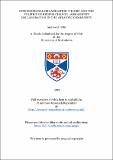Files in this item
International organisation theory and the politics of regime change : armaments collaboration in the Atlantic community
Item metadata
| dc.contributor.advisor | Salmon, Trevor | |
| dc.contributor.author | Ellis, Andrew S. | |
| dc.coverage.spatial | 276 p. | en_US |
| dc.date.accessioned | 2018-07-13T10:13:14Z | |
| dc.date.available | 2018-07-13T10:13:14Z | |
| dc.date.issued | 1993 | |
| dc.identifier.uri | https://hdl.handle.net/10023/15352 | |
| dc.description.abstract | The purpose of the analysis is to make a theoretical contribution in two related fields of international relations research. Firstly, the concepts of complex interdependence and international regimes are critically examined with particular reference to the development of existing theories of regime creation and change. The role of organisation theory in encouraging the development of a new process based model with which to analyse the formation and alteration of international regimes is introduced. Secondly, by way of an analysis of the failure of an armaments collaboration regime to evolve in the period between 1949 and the late 1960's in the North Atlantic community of states, a vital component of the national security policies of the states involved will be studied from an essentially inter-organisational perspective. The issue area of armaments collaboration, and the complex of actors involved, represent a real challenge to regime analysis and especially the assumptions which are inherent in the theory of hegemonic stability. The role of hegemonic actors in the formation and maintenance of regimes, and the implications of this for the armaments collaboration issue area, are particularly important in this regard. The study aims to highlight the extent to which the prerogatives of states and governmental actors in areas of "high politics" have been constrained by transnational activities or bodies. The emergence of American dominance in the armaments collaboration issue area since 1945, and the prospects for a European alternative to such dominance, is one of the major foci of the analysis. The evolution, development and role, if any, of informal regimes in this area will be examined with particular reference for changing patterns in armaments collaboration between 1949 and the late 1960's. | en_US |
| dc.language.iso | en | en_US |
| dc.publisher | University of St Andrews | |
| dc.subject.lcc | JX1395.E6 | |
| dc.subject.lcsh | International relations--Methodology | en |
| dc.title | International organisation theory and the politics of regime change : armaments collaboration in the Atlantic community | en_US |
| dc.type | Thesis | en_US |
| dc.contributor.sponsor | University of St Andrews | en_US |
| dc.type.qualificationlevel | Doctoral | en_US |
| dc.type.qualificationname | PhD Doctor of Philosophy | en_US |
| dc.publisher.institution | The University of St Andrews | en_US |
This item appears in the following Collection(s)
Items in the St Andrews Research Repository are protected by copyright, with all rights reserved, unless otherwise indicated.

